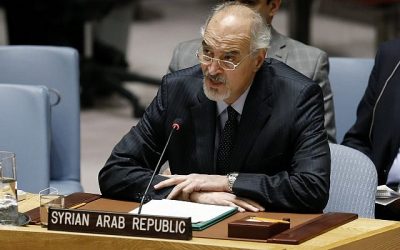Syrian “Threats” & “Israeli” Actions: Rhetoric vs. Reality

Permanent Representative of the Syrian Arab Republic to the United Nations Bashar Jaafari provocatively remarked that his country might target the Tel Aviv airport the next time that “Israel” bombs the Damascus one, but far from the “threat” that it’s being portrayed as, he was just employing creative rhetoric in order to make a point that highlights the so-called “international community’s” double-standards towards “Israeli” actions.
The whole world was witness to how “Israel” recently resumed its anti-Iranian bombing campaign in Syria over the past week following Netanyahu’s promise earlier in the month to do whatever is needed in order to dislodge his hated foe from the neighboring country. Nobody – least of all the Syrians – should have been surprised that Russia stood back and “watched the fireworks” since Moscow is allied with Tel Aviv and has no intention whatsoever of risking World War III for the sake of the Syrian Arab Army (SAA), let alone its Hezbollah and IRGC partners, when its military mandate in the country is strictly to fight international terrorist groups and not defend the host state from conventional outside aggression.
That being the case, the SAA cannot realistically depend on Russia to protect it in the event that Damascus makes the decision to retaliate against “Israel” in kind since such an unprecedented move would surely lead to the self-professed “Jewish State” throwing everything that it has against the Arab Republic and repeating the US’ notorious 2003 “shock and awe” campaign. This obvious observation is why Permanent Representative of the Syrian Arab Republic to the United Nations Bashar Jaafari’s provocative remark about responding to “Israel” in such a fashion should be interpreted as nothing more than creative rhetoric in order to make a point that highlights the so-called “international community’s” double-standards towards “Israeli” actions.
So as not to be accused of misrepresenting Jaafari’s comments, here’s what Sputnik reported that he said:
“Isn’t it is the right time for this council to take the necessary measures to stop the repeated Israeli aggression against the territories of my country or should we attract the attention of the war makers in this council be exercising our legitimate right for self-defence and respond to the Israeli aggression against the Damascus International Airport by launching an aggression against Tel Aviv Airport?”
That being the case, Jaafari also attempted to contrast his so-called “threat” with “Israel’s” actual actions in drawing attention to the difference between rhetoric and reality. Whereas the Syrian UN Representative is just sounding off, “Israel” is really plotting more strikes against the Arab Republic’s airports and other places where it suspects its Hezbollah and IRGC foes to be sheltering soldiers and weapons. Technically speaking, “Israel” is violating international law, though Tel Aviv “defends” its actions under the guise of “anti-terrorism” and the fact of the matter is that nobody – let alone all five permanent members of the Security Council altogether – is going to do anything to punish it.
For as much as some in Alt-Media might want to believe that Jaafari’s words “taught Israel a lesson”, they shouldn’t get their hopes up whatsoever because Netanyahu is instrumentalizing his anti-Iranian strikes in Syria for political purposes in hoping that they sway former “IDF” chief and right-wing rival Benny Gantz’s supporters over to his side before early elections at the beginning of April. Netanyahu is fighting for his political life like never before and he’s not going to go down without a fight, but instead of taking swings at his political enemies, he’s decided that it’s much more politically expedient to abuse Syria as his punching bag instead.
*
Note to readers: please click the share buttons above. Forward this article to your email lists. Crosspost on your blog site, internet forums. etc.
This article was originally published on Eurasia Future.
Andrew Korybko is an American Moscow-based political analyst specializing in the relationship between the US strategy in Afro-Eurasia, China’s One Belt One Road global vision of New Silk Road connectivity, and Hybrid Warfare. He is a frequent contributor to Global Research.
Featured image is from The Times of Israel

